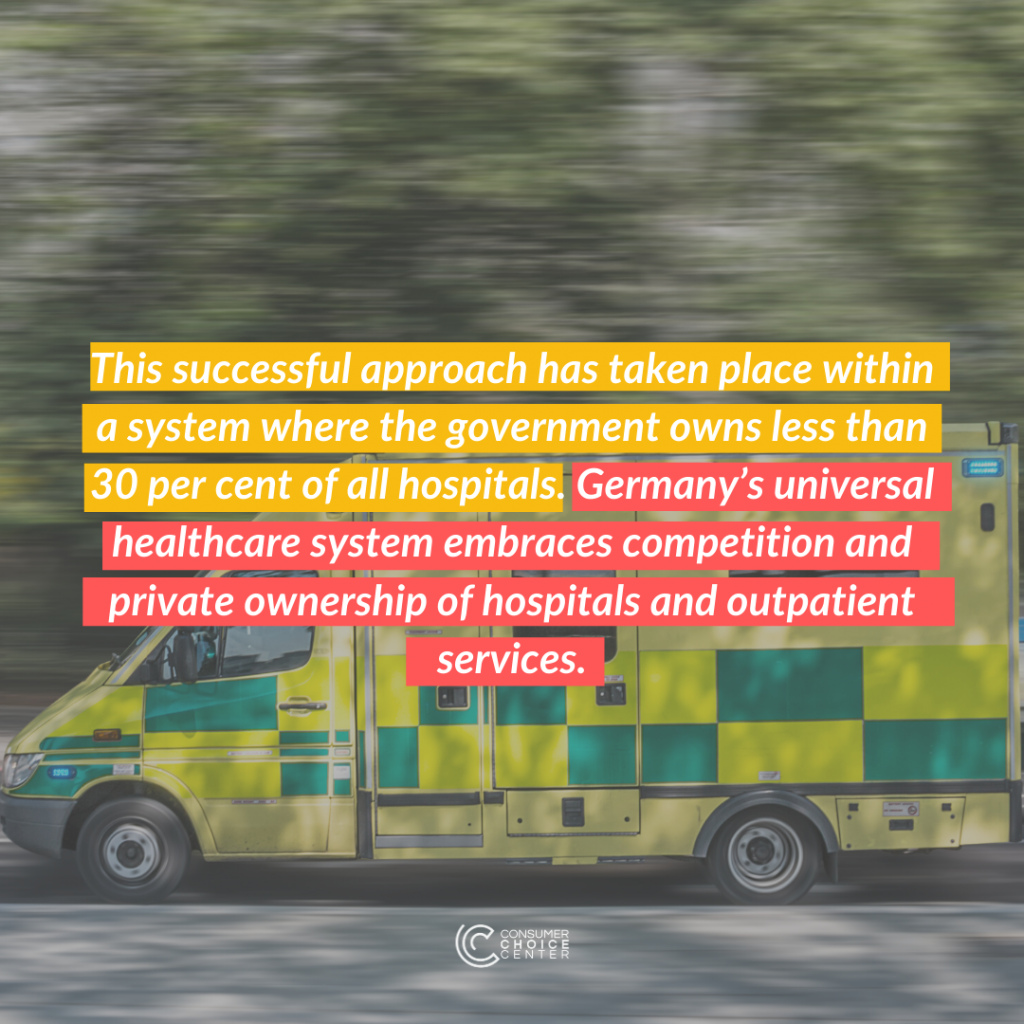In both Germany and the United Kingdom, around 0.18 per cent of the total population has recently tested positive for coronavirus. While the spread of the pandemic is roughly equal in these countries, the fatality rate is 420 per cent higher for patients treated by the NHS compared with those treated in Germany. This is because Germany’s hospitals are better placed to be resilient in times of crisis, thanks to the private and competitive aspects of the country’s healthcare system.
Germany’s decentralised and private laboratory network had already tested over two per cent of its population when the UK’s figure still stood at a meagre 0.7%. Britain’s centralised testing system, and its failure to scale up Covid-19 tests, might explain part of this mortality gap. One could assume that only very severe cases are being tested by the NHS and, as such, the fatality rate of this more concentrated group is higher.

Even if you make very generous adjustments to the figures and assume that Britain’s fatality rate would remain unchanged even if the NHS tested as many people as the German system, the UK would still have a 49 per cent higher death rate.
Not only are the NHS’s testing facilities incapable of dealing with black swan events, the entire healthcare system simply doesn’t have sufficient resilience to minimise the harm caused to patients by a virus such as Covid-19.
Conversely, Germany’s mainly private and non-profit hospital system leads the way in Europe when it comes to successfully facing this wave of patients. In early March, hospitals had already freed up beds in intensive care by pushing back elective surgeries, and the total capacity of ICU beds was ramped up 40 per cent within a month. Germany’s hospitals now have a total of 40,000 ICU beds and 30,000 beds with respiration units.
And all of this was achieved while still ensuring the provision of critical services such as cancer care and screening, which is something that the NHS is struggling to do – a problem that may cause more harm than Covid-19.
Thanks to the recent increase, Germany has now 48 ICU beds per 100,000 inhabitants, which is more than seven times the capacity the UK currently has. This month, the NHS published the occupancy rate of critical care beds in February, which showed over 80 per cent of those were in use. And while Germany was deploying a new public database showing critical care capacity per hospital, which is updated at least once a day, the NHS paused the publication of many of its own statistics, and those that are released are at least a month old.
What’s more, Germany’s new online ICU capacity register was built overnight, a tool that provides patients and doctors with invaluable guidance. One map, for example, shows that in Bavaria, which is the state worst-hit by Covid-19, just 16.1 per cent of ICU beds are occupied by patients with coronavirus. It also shows the available number of empty ICU beds. Bavaria still has 37 per cent of all its ICU beds empty and can, therefore, comfortably treat three times more Covid-19 patients than now.
This successful approach has taken place within a system where the government owns less than 30 per cent of all hospitals. Germany’s universal healthcare system embraces competition and private ownership of hospitals and outpatient services. So while the social insurance system covers 90 per cent of the population, the provision of care is mainly carried out by private for-profit hospitals or charities.
Simply put, private hospitals and competition lead to much more efficient structures, and Germany’s decentralised healthcare system, which allowed for a speedy mitigation strategy, is now showing its value by saving thousands of lives. Indeed, Germany is not only weathering this storm better than the NHS but it is even able to fly in and treat hundreds of patients from Italy, France and Spain.
British policymakers will need to show courage in the coming months and be honest about the failings of the UK’s healthcare system during this crisis. There are two crucial lessons that will need to be learned in order to prevent, or at least mitigate, another lacklustre response in the future.
The first is that introducing more market mechanisms in the NHS would not mean that patients were denied care – you can have universal healthcare in a social insurance model too. And the second is that having more private hospitals does not necessarily lead to fewer hospital beds, but a better allocation of skills and resources. Indeed, it allowed Germany to scale up its ICU capacity, as well as keeping services such as cancer treatments and screenings open in different locations.
The centralised nature of NHS does not allow for any part of the chain to fail. Unfortunately, failure is in our nature and less centralised systems are therefore necessary in order to achieve resilience and adaptability in times of urgent need.
We should make the UK fit for the next nasty virus by decentralising testing and allowing for more private sector involvement in our healthcare system. It’s high time we faced the facts about the NHS and stopped ignoring success stories from around the world.
Originally published here.
The Consumer Choice Center is the consumer advocacy group supporting lifestyle freedom, innovation, privacy, science, and consumer choice. The main policy areas we focus on are digital, mobility, lifestyle & consumer goods, and health & science.
The CCC represents consumers in over 100 countries across the globe. We closely monitor regulatory trends in Ottawa, Washington, Brussels, Geneva and other hotspots of regulation and inform and activate consumers to fight for #ConsumerChoice. Learn more at consumerchoicecenter.org




